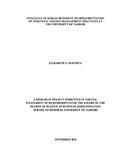| dc.contributor.author | Maithya, Elizabeth, N | |
| dc.date.accessioned | 2017-01-04T11:59:37Z | |
| dc.date.available | 2017-01-04T11:59:37Z | |
| dc.date.issued | 2016 | |
| dc.identifier.uri | http://hdl.handle.net/11295/98878 | |
| dc.description.abstract | Strategic change implementation in organizations requires careful planning and
knowledgeable human resource with the required skills, knowledge and attitudes.
The need for this study came as a result of understanding how human resource can
influence strategic implementation at the University of Nairobi and how these
changes are being implemented to meet the expectations of their customers and
achieve a competitive advantage for success and survival. The research design used
was a case study and both primary data and secondary data were collected. Data was
analyzed using content analysis. The researcher managed to interview three
interviewees who were; a Director, a Records Manager and one of the Senior
Administrative Staff. The study found out that there have been various strategic
changes that have been taking place at the University of Nairobi; the major change
being adoption of information communication technologies which enhanced sharing
of information among its stakeholders. The study revealed that knowledge is
considered to be a key strategic resource that does not depreciate and can generate
increasing returns. The findings further revealed that challenges that were
encountered in strategy implementation were resistance to change, inadequate
resources and lack of adequate personnel. It was observed that the University had
adopted performance contracting, service charter and International Standard
Organization (ISO) that guided them in improving their service delivery. It was also
observed that the University values staff training that is geared towards improving
their skills and knowledge. The study recommends that the University should
continuously train and develop its employees to enable them cope with environmental
changes and reduce resistance to change. The study further recommends that the
University should allocate more resources to ensure that there are adequate facilities
and available funds to implement the chosen strategies. The major limitation of the
study was that it was carried out within a short period of time and this could not allow
the researcher to collect enough data for comprehensive analysis and the interviewees
had limited time to answer the research questions due to their busy schedule. The
study concludes that, human resource is key to strategy implementation as they
control the other resources. The study suggests that, further research should be
carried out to investigate the influence of human resource on implementation of
strategic change management practices adopted by other universities and use a survey
design instead of a case study. Key recommendations of the study are that, the
university should invest in human resource for effective strategic change
implementation, involve stakeholders in the strategic change processes and make
training its culture to impart the required knowledge and skills to enable its employees
cope with environmental changes. | en_US |
| dc.language.iso | en | en_US |
| dc.publisher | University of Nairobi | en_US |
| dc.rights | Attribution-NonCommercial-NoDerivs 3.0 United States | * |
| dc.rights.uri | http://creativecommons.org/licenses/by-nc-nd/3.0/us/ | * |
| dc.subject | Influence of Human Resource on Implementation of Strategic Change Management Practices | en_US |
| dc.title | Influence of Human Resource on Implementation of Strategic Change Management Practices at the University of Nairobi | en_US |
| dc.type | Thesis | en_US |



